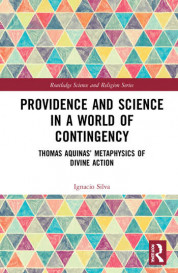 Providence and Science in a World of Contingency. Thomas Aquinas’ Metaphysics of Divine Action
Providence and Science in a World of Contingency. Thomas Aquinas’ Metaphysics of Divine ActionIgnacio Silva, Routledge, 2021
Providence and Science in a World of Contingency offers a novel assessment of the contemporary debate over divine providential action and the natural sciences, suggesting a re-consideration of Thomas Aquinas’ metaphysical doctrine of providence coupled with his account of natural contingency. By looking at the history of debates over providence and nature, the volume provides a set of criteria to evaluate providential divine action models, challenging the underlying, theologically contentious assumptions of current discussions on divine providential action. Such assumptions include that God needs causally open spaces in the created world in order to act in it providentially, and the unfitting conclusion that, if this is the case, then God is assumed to act as another cause among causes. In response to these shortcomings, the book presents a comprehensive account of Aquinas’ metaphysics of natural causation, contingency, and their relation to divine providence. It offers a fresh and bold metaphysical narrative, based on the thought of Thomas Aquinas, which appreciates the relation between divine providence and natural contingency.
The book is available on Routledge’s website.
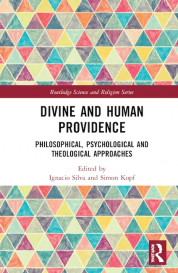 Divine and Human Providence. Philosophical, Psychological and Theological Approaches
Divine and Human Providence. Philosophical, Psychological and Theological ApproachesIgnacio Silva and Simon Kopf (eds), Routledge, 2020
This volume offers an original perspective on divine providence by examining philosophical, psychological, and theological perspectives on human providence as exhibited in virtuous human behaviours. Divine providence is one of the most pressing issues in analytic theology and philosophy of religion today, especially in view of scientific evidence for a natural world full of indeterminacies and contingencies. Therefore, we need new ways to understand and explain the relations of divine providence and creaturely action.
The volume is structured dynamically, going from chapters on human providence to those on divine providence, and back. Drawing on insights from virtue ethics, psychology and cognitive science, the philosophy of providence in the face of contingent events, and the theology of grace, each chapter contributes to an original overall perspective: that human providential action is a resource suited specifically to personal action and hence related to the purported providential action of a personal God.
By putting forward a fresh take on divine providence, this book enters new territory on an age-old issue. It will therefore be of great interest to scholars of theology and philosophy.
The book is available on Routledge’s website.
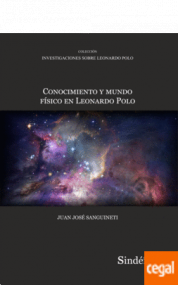 Conocimiento y mundo físico en Leonardo Polo
Conocimiento y mundo físico en Leonardo PoloJuan José Sanguineti, Editorial Sindéresis, 2020
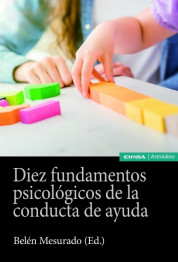 Diez fundamentos psicológicos de la conducta de ayuda
Diez fundamentos psicológicos de la conducta de ayudaBelén Mesurado, EUNSA, 2020
(Español) Este libro surge de la necesidad de dar una explicación académica de diferentes tipos de conductas o expresiones de generosidad que somos capaces de expresar los seres humanos. El objetivo principal es presentar una descripción y clasificación de los diferentes manifestaciones de generosidad o tipos de conductas prosociales, para luego hacer foco en 10 diferentes aspectos psicológicos que se constituyen como fundamento de la formación y desarrollo de la generosidad humana. Cada capítulo dará cuenta de investigaciones empíricas que muestran la relación entre diferentes virtudes sociales o rasgos psicológicos que favorecen el surgimiento de las conductas de generosidad permitiendo así un desarrollo psicosocial positivo de la persona.
Como muestran estudios previos las raíces de la generosidad o de las conductas prosociales son múltiples y pueden hallarse en factores biológicos, culturales, familiares y en características psicológicas individuales. Sin embargo, en esta obra nos focalizaremos solamente en ciertos aspectos intrapsíquicos como virtudes sociales o rasgos que pueden ser promovidos a través de la educación o de diferentes estrategias de promoción. Es importante resaltar, que esta obra no pretende agotar todas las características individuales vinculadas con la prosocialidad sino que se eligieron aquellas 10 vías que mostraron hasta el momento ser un sólido fundamento para el surgimiento de la conducta generosa o prosocial.
El libro se encuentra disponible en el sitio de EUNSA.
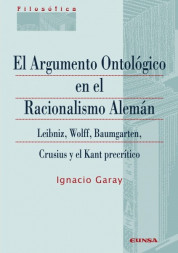 El Argumento Ontológico en el Racionalismo Alemán. Leibniz, Wolff, Baumgartem, Crusius y el Kant precrítico
El Argumento Ontológico en el Racionalismo Alemán. Leibniz, Wolff, Baumgartem, Crusius y el Kant precríticoIgnacio Garay, EUNSA, 2019
The question about the existence of God has been of central importance throughout the history of philosophy. Among all the arguments in its favor there is one that stands out for its peculiarity and influence in the thinking of almost all the most important philosophers: the so-called ontological argument. Since its original formulation by St. Anselm of Canterbury in his Proslogion, this argument has generated such fascination that virtually none of the most prominent philosophers has deprived himself of commenting on it. Despite being a classic issue, the study of the ontological argument is today as relevant as it has always been. A distinctive feature of the contemporary dispute around it (awakened by Findlay, Hartshorne, Malcolm and Plantinga and which continues to this day) is the strong influence of the formulations and objections coined in German rationalism.
The book is available on EUNSA’s website.
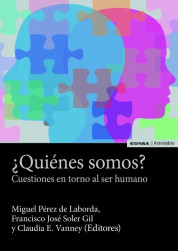 ¿Quiénes somos? Cuestiones en torno al ser humano
¿Quiénes somos? Cuestiones en torno al ser humanoMiguel Pérez de Laborda, Claudia E. Vanney, and Francisco José Soler Gil, EUNSA, 2018
The birth of philosophy is inseparable from the fundamental questions about the human being: Who are we? Where do we come from? Where are we going? The answer to these questions depends on many other issues that challenge us all, such as the relationship of the human being with Nature, what distinguishes us from other living beings, how we relate to each other (family, friendship, society, etc.) and, in a much more personal way, the meaning of our life. In recent times these classic questions have been become even more urgent due to the vertiginous development of science and technology. Many think today, for example, that in a few decades we will be able to overcome all the limits of our species, enjoying superintelligence, superlongevity and superwellbeing (Transhumanism).
The book is available on EUNSA’s website.
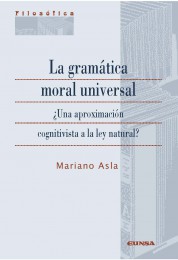 La gramática moral universal. ¿Una aproximación cognitivista a la ley natural?
La gramática moral universal. ¿Una aproximación cognitivista a la ley natural?Mariano Asla, Ediciones Universidad de Navarra, 2016
EUNSA has published the book “Universal Moral Grammar. A cognitive approach to natural law?” (in Spanish) by Dr Mariano Asla.
By its very nature, ethical speculation has been since its inception a land for intellectual dialogue, where ordinary knowledge, philosophy and different religious faiths converged, sought and gave reasons. But this scenario today has become more complex and presents novel edges, due to the emergence of the individual sciences (especially from the cognitive perspective) in the study of moral phenomenon. In this context of naturalization of ethics, a research program inspired by Chomsky’s linguistics, called Universal Moral Grammar was developed in recent years. UMG argues, in essence, that under the spontaneous moral intuitions there is a network of cognitive, innate and unconscious principles, which are the evolutionary heritage of our species.
In this book the author proposes a philosophically weighted and critical reading of this research program, tending to its possible inclusion in the broader debate about the ethical universals and establishing some nontrivial affinities with the notion of natural law proposed by the Thomist tradition.
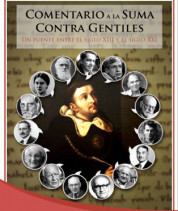 Comentario a la Suma contra Gentiles
Comentario a la Suma contra GentilesGabriel Zanotti, Biblioteca Instituto Acton, 2015
The Summa contra Gentiles offers a great opportunity to re-encounter reason and offer it to everyone. Reasoning from the synthesis and union between reason and faith, this book puts St. Thomas Aquinas in contact with the 20th and 21st centuries. Its main objective is to promote the dialogue between the Thomistic synthesis and contemporary thought: phenomenology, hermeneutics, existentialism, the philosophy of language and logic, the philosophy of science, current cosmological debates, psychoanalysis, the philosophy of social sciences and, therefore, also with the philosophy of law and economy.
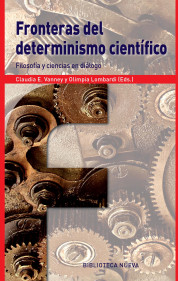 Fronteras del determinismo científico. Filosofía y ciencias en diálogo
Fronteras del determinismo científico. Filosofía y ciencias en diálogoClaudia E. Vanney y Olimpia Lombardi (eds.), Biblioteca Nueva, 2015
Is our reality determined or, on the contrary, is it left to chance and surprise? The tension between determinism and indeterminism has been a constant concern of human beings in different times and cultures, finding multiple responses in the history of philosophy from the Greek ‘Ananke’ or the Latin ‘fatum’, which embodied the idea of a destination that marks life, both human and divine, to the idea of a world that has lost all certainty and security.
In this book the question of determinism is approached from many different fields, from quantum mechanics, chaos theory and the microscopic chemistry in the area of physico-chemical sciences, to genetics, evolutionary developmental biology and conservation biology in the domain of life sciences, also including some specifically philosophical domains such as those related to the problem of freedom and free will.
The book is available on Biblioteca Nueva‘s website.
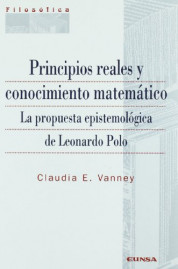 Principios reales y conocimiento matemático. La propuesta epistemológica de Leonardo Polo
Principios reales y conocimiento matemático. La propuesta epistemológica de Leonardo PoloClaudia E. Vanney, Ediciones Universidad de Navarra, 2008
Is it possible to gain access to knowledge of the real principles of the physical universe? Currently some branches of physics, such as cosmology, seek to establish a general theory that encompasses or comprises in itself all the results achieved by science, and to this end they develop highly mathematized models. Is this the way to know the principles of extra-mental reality, or is it a way that only allows us to dominate nature? Is the access to knowledge of physical principles a scientific question or does it result from a philosophical attitude?
The book deals with Leonardo Polo’s physics of causes, unitarily presenting the complete spectrum of the knowledge of extra-mental reality according to his philosophical proposal. It seeks to account both for scientific knowledge and its progressive rationality, and to achieve the unitary view of cosmos that characterizes traditional philosophies of nature. The elements of Polian causal physics that allow to develop a philosophy of mathematics, physics and biology, in harmony with contemporary sciences are especially explored.
The book is available on EUNSA’s website.
Menu
- Our Institute
- Programs
-
Projects
- Research Projects
- Developing the intellectual virtues for research in Science and the Big Questions
- Developing the intellectual virtues for research in Science and the Big Questions
- Irreplaceability of Persons
- “Hero” and “Little Hero”
- Human and Divine Providence
- The Brain and the Person
- Spanish Interdisciplinary Dictionary in Science, Philosophy and Theology
- Determinism and Indeterminism: From Science to Philosophy
- The Debate on Determinism and its Physical Foundations
- Projects funded by UA
- Publications
- Events
-
Videos
- Lectures
- The theory of knowledge of Leonardo Polo
- Interdisciplinary Research Week “From the Brain to the Self”
- Interdisciplinary Research Week “From the Brain to the Self”
- Transhumanism
- Workshop “Personal Identity and Agency”
- (Español) Neurociencia y antropología – Juan José Sanguineti
- Prof Eleonore Stump’s Visit
- Determinism and Indeterminism. From Neuroscience to Philosophy
- Big Questions. From Science to Philosophy and Theology
- Determinism and Indeterminism. From Biology to Philosophy
- Determinism and Indeterminism. From Physics to Philosophy
- Science & Religion
- John Henry Newman and the University
- Interviews
- ‘Hero’ Project
- Short videos
- Lectures

